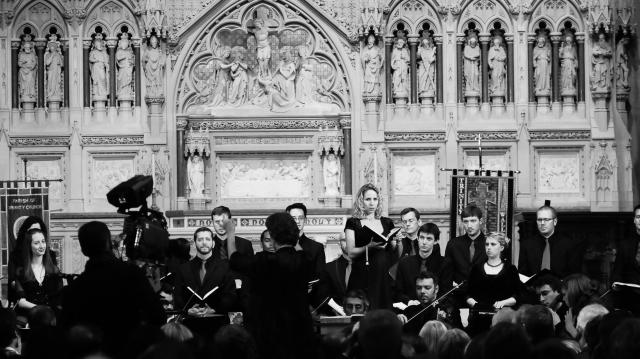The Passion and Promise of Messiah

Acclaimed Baroque specialist Jane Glover, who conducts Trinity’s “exhilarating” performance this season, on what first captivated her about Handel’s masterpiece—and what keeps drawing her back.
Those who’ve heard Trinity’s gripping rendition of Handel’s Messiah presented in our soaring, acoustically rich Neo-Gothic building know it’s a transcendent experience.
Few people understand the life-changing power of this oratorio better than celebrated British conductor Jane Glover, who returns this year to lead Trinity's Messiah for a second time.
Glover heard her first Messiah at nine years old when she visited Lincoln Cathedral in the United Kingdom with her family. She was so captivated that she left knowing she would one day become a musician – and indeed today is a Baroque specialist and music scholar whose career has taken her all over the world. Glover has conducted every major symphony and chamber orchestra in Britain and was named Dame Commander of the Order of the British Empire for services to music. After conducting nearly 120 Messiah concerts, Glover comes to New York City December 11–13 to lead Trinity’s version of Handel’s masterwork, which The New York Times has declared “the gold standard” of New York’s Messiah season.
Glover’s exceptional credentials and her embrace of Messiah’s potency are what made her an obvious choice for this year’s concert, said Trinity's Director of Music, Melissa Attebury.
“Messiah has been a cherished tradition at Trinity ever since it was first presented here in 1770. With such a long and storied history, we felt it was incredibly important to have one of the world’s top interpreters lead Messiah this year,” Attebury said. “Jane is a master. She's both electrifying and elegant, and approaches Messiah as a work of drama, operatic in scope.”
We recently spoke with Glover about Trinity’s unique Messiah tradition and the special message the oratorio has for the world today.
Tell us about the first time you ever heard Messiah.
I remember everything about that performance. My grandparents lived in the small cathedral city of Lincoln, in the shadow of the Lincoln Cathedral. We were visiting them for Christmas and all trooped over the road to hear Messiah. It blew my mind. I remember who was singing, what they were wearing. I remember the impact of the piece as a whole, not just the big numbers like the “Hallelujah Chorus” but the more intimate parts, too. It spoke to me in a way I can’t explain.
Why do you think Messiah still has the power to captivate people, almost 300 years after it was written?
It’s a massive story, told with the sure hand of a brilliant, theatrical teller of tales, which is who Handel was. And of course there’s the remarkable libretto that Charles Jennens compiled; he chose the perfect bits of Biblical text for Handel to produce this extraordinary story of nativity, passion, and redemption. It has become the most famous piece of classical music ever. I think even Handel would be astonished! I'm now approaching my 120th performance and it’s still as fresh as paint for me every time.
You know so much about Handel — you’ve even written a book about his time in London. Do you incorporate his history and spirit into performances of Messiah?
Handel is quite difficult to get to know. Unlike Mozart, he left us virtually no letters; he was very private. He never married. He lived alone. Although he had many friends and was comfortable in all company — whether having a drink in the pub with the lay vicars at St. Paul’s Cathedral or hobnobbing with the royals in the palaces — at the end of the day, he liked to go home, shut the door, and look at the fire. And yet I think one does get to know him through his music. Particularly towards the end of his life, we begin to see his incredible religious conviction coming through, certainly in Messiah. Knowing more about him makes it a richer experience for me.
You’ve conducted Messiah at Trinity once before in 2009, so you’re familiar with our tradition of sharing the four soloist roles among nearly 20 members of our choir. How does this change the performance?
I love it. To have different people singing different arias — stepping out from the choir and then back in again — increases the intensity of the communal experience, the idea that we’re all sharing this together as musicians. We're not sitting back and letting somebody else in an expensive frock who has been paid a great deal of money do the work. We’re all doing it together.
For the first time this year, the Trinity Youth Chorus will perform parts of Messiah by singing from the balcony above the audience. How will that add to the performance?
It’s a fabulous thing for the young people to join us, especially the “Glory to God” chorus. That piece begins with the words, “And suddenly there was with the angel a multitude of the heavenly host.” So the choristers will help us fill the church with a huge number of different voices!
Messiah has inspired countless people over the centuries. In this particular moment, this year, this climate, what message does this oratorio have for us?
I hope people leave with a confirmation of the essential goodness and kindness of people, of the strength of the human spirit to survive whatever is thrown at it. I do feel there's a universal message of comfort. That’s the first word of the entire piece, “Comfort ye my people.” And the last word is “Amen.” Between those two words, we all go on a massive journey of joy, grief, and redemption. If that’s not a metaphor for life and an ultimate message of optimism, I don’t know what is!
Watch this year’s performance of Messiah recorded live on YouTube from Trinity Church on Friday, December 13.






